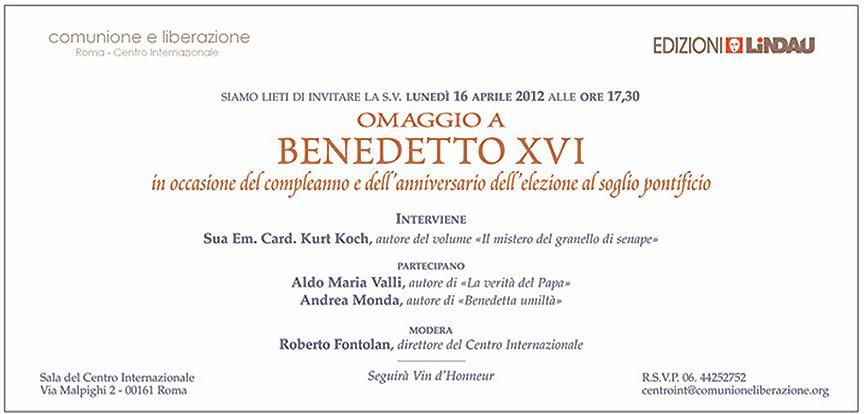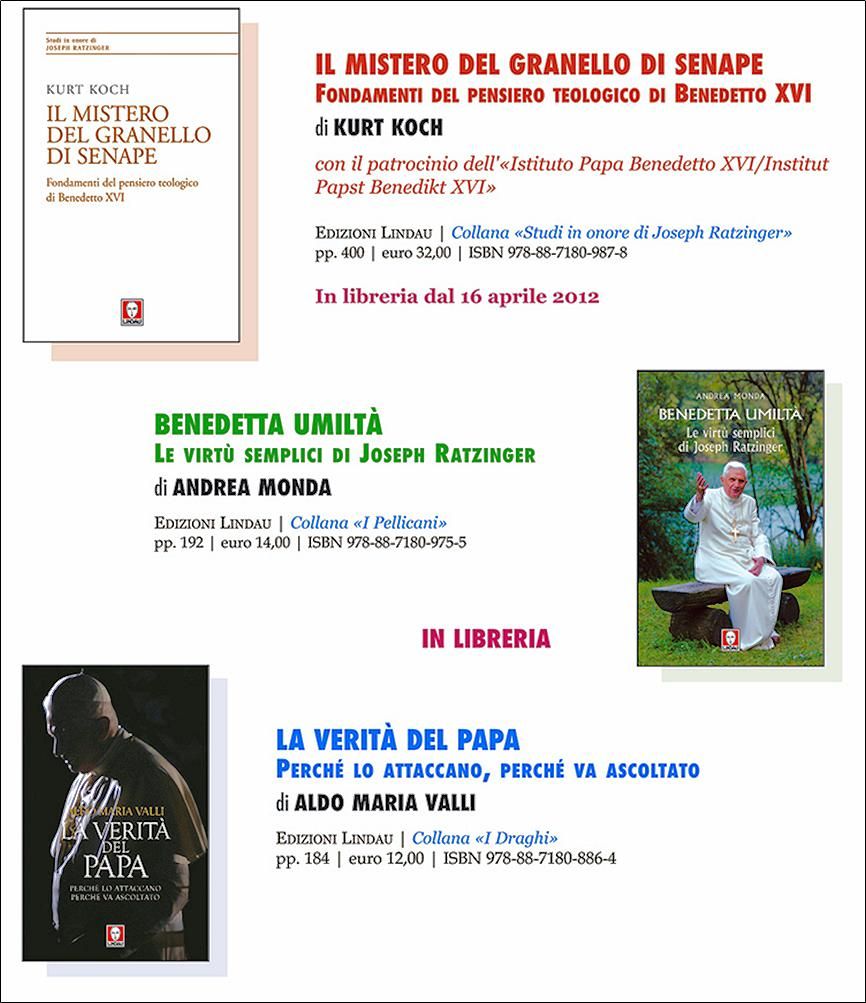
 A book homage to Benedict XVI
A book homage to Benedict XVI
Comunione e Liberazione in Rome has joined hands with Lindau publishing house for an event Monday afternoon to mark the 85th birthday of Benedict XVI.

It is the presentation of a new book on Joseph Ratzinger's theology written by Cardinal Kurt Koch, president of the Pontifical Council for Promoting Christian Unity. The book was commissioned by the Regensburg-based Institut Papst Benedikt XVI, publishers of the Collected Writings of Joseph Ratzinger.
It is strange there was not much publicity about this in Italy - it is remarkable enough that an Italian edition appears so soon after the original in German which, I learn from the Institut site, came out in February...Even L'Osservatore Romano which published an excerpt from the Introduction in today's issue does not identify its provenance nor otherwise publicize the book. I thought it was an article written especially for the OR - until I saw small item under the article about the Lindau event, and Mons. Koch's book title was mentioned...
Cardinal Koch is, of course, a theologian of repute in his own right, and he says in the introductory essay, he wrote the book over a period of five years when he was the Bishop of Basel, because he thought it was important to help the faithful not just to understand Benedict XVI's thinking but to counteract misinformation and disinformation that has been peddled about him, especially the charge that he has been trying to undo Vatican-II.
 The mystery of the mustard seed:
The mystery of the mustard seed:
Foundations of Benedict XVI's theological thought
400 pp, 32 euro
The mystery of the mustard seed
From the Introduction to the book
by Cardinal Kurt Koch
Translated from the 4/15/12 issue of

"Great things always start as a mustard seed, and mass movements always have a short duration".
This sentence written by Benedict XVI when he was still Prefect of the Congregation for the Doctrine of the Faith to describe the demands of new evangelization, best bring to light what Joseph Ratzinger has at heart as theologian, bishop and Pope.
It is therefore not surprising that he cites and meditates continually on the parable of the mustard seed (Mk 4,30-32): The mustard seed is the smallest seed of all, but it becomes the largest of plants such that even the birds from the skies can make their nests in its shade.
The comparison with the mustard seed illustrates not only that big realities begin from little things, according to that elementary principle that Pierrre Teilhard de Chardin, in his writings on evolution, called the law of invisible origins.
Such a comparison offers proof of the basic principle at work in all of God's history with mankind, his creatures - what Pope Benedict XVI has called God's "predilection for the little".
In the unmeasurable vastness of the cosmos and among the infinite number of planets and galaxies, God chose earth - this little speck of dust - for his salvific action. And on this tiny earth, God chose among all the peoples Israel, a people who were practically impotent on the political level, as the load-bearing pillar of his history with mankind.
In Israel, God chose the modest site of Bethlehem to come to us men as man himself. In Bethlehem, he chose an unknown girl who had little importance, Mary, in order to enter our world.
In the course of history, God has always called on simple men who, in immersing themselves personally in the Gospel, are capable of renewing the Church from within.
The mustard seed is not just a metaphor for Christian hope, but also shows that the great can be born from little things not by means of revolutionary upheavals nor even because we men are in charge of such growth, but precisely because growth takes place slowly and gradually, following its own dynamic. In view of this, the Christian attitude can only be one of love and patience, which is the long breath of love.
The comparison with the mustard seed also leads us to the heart of Pope Benedict XVI's theological thinking, which is love: God's love for us men, which is unimaginable, but nonetheless corresponds to the logos, and the human response to divine love which can be realized only in love of God and other men.
In the light of God, in Jesus's parable of the mustard seed, the emphasis is placed not only on the plant that becomes large, but on the seed, and therefore, on hope and its quiet growth in patience, precisely because God himself judges and appreciates patience as a particularly sensible sister of love, and because of this, continually makes the big grow from the small.
The parable is therefore meant to awaken in us men the joy over the beauty that is intimately linked to hope and leads us to the mystery of God and the story of salvation, as Benedict XVI underscored during his meeting with artists: "The way of beauty therefore leads us to grasp the All in the fragment, the Infinite in the finite, and God in the history of man".
On the contrary, we men are always tempted to take the particular to be everything, to confuse the finite with the infinite, and consequently, to place the accent, in Jesus's parable, on growth.
We would want, with nervous impatience, to have a robust tree rapidly, and if necessary, to contribute to this with our own hands, our effort to be able to see right away some result, and in pastoral work, we risk neglecting the care of souls in our preoccupation with numbers.
This temptation could also come when the theological thinking and the pastoral work of Pope Benedict XVI are continually exposed to serious misunderstanding, of which we can briefly recall those that are most often expressed.
A widespread criticism is that the Pope does not have at heart the greater 'church of the people' - the masses - and that he primarily addresses himself to small flocks and is content with that.
In this criticism, the only true thing is that the Pope is truly convinced that the true renewal of the Church cannot begin from the masses, but only from small movements, as the history of the Church has shown in diverse cases, and as it is visible today, for example, in the new ecclesial movements which were not the outcome of any official plans by the Church, and because of this, they may be considered a gift of the Holy Spirit in the situation of the post-Conciliar Church.
But in the eyes of the Pope, they fulfill their ecclesial mission only if they act as leaven within the Church, making it visible that "there is one Church for all, that there are no churches for the elite nor churches by election".
"The Church is not a market in which each one seeks out his own grouplet, but a family in which I do not seek brothers but I receive them as a gift from God".
With the parable of the mustard seed, the Pope underscores that activity in the Church should have as its reference point her mystery, and not the exigency of having a great tree result from it right away.
The Church is at the same time a mustard seed and a tree, and the Pope underscores that "Perhaps the Church should find herself faced with great trials (1Ts 1,6) in order to learn anew what it lives from even today - that it lives from the hope in the mustard seed, and not from the power of its plans and structures".
Another criticism which is more profound and often reiterated is that the Pope has moved backwards and really wants to return the Church to what it was before Vatican II.
Those who do not just blindly rely on the communications media - which do not usually offer serious information but entertainment - and who do pay attention autonomously to what the Pope says and does, would know right away that the Pope absolutely does not want to go 'backwards', as he is often reproached publicly (whether out of ignorance or because they represent those theologians who, even if they know better, often make 'populist' statements and intentionally affirm the opposite to the public, confusing scientific 'honesty' for political agitation within the Church).
Pope Benedict absolutely is not going backwards. What he does is to go in more deeply, like the mustard seed which can only grow when it is deep in the soil. Therefore, for him, single reforms do not mean anything unless the foundations and the heart of Christian faith shine forth again.
He wants a simplification of Christian faith as he has announced exemplarily in his three encyclicals. It is an urgent task today to present the true face of Pope Benedict XVI's theological thinking and Magisterium.
In the last five years, I have tried to do so as best as I can, and to the degree that my daily and detailed work as a bishop allowed me time - convinced that it is also part of my responsibility as a bishop to help the faithful orient themselves in the confusion of so many points of view and in the chaos of mediatic information, of targeted disinformation and of deliberate manipulation of facts.
With the publication of this book, I hope to provide to a wider circle some spiritual orientation and discernment. I took on this task not least because there are situations in the life of the Church in which the mission that Jesus entrusted to Peter at the Last supper, which is valid for his Successor, namely to confirm your brothers in the faith (Lk 22,32), must also be applied inversely, and that a local bishop must feel it is his duty to sustain the Successor of Peter in his important ministry.
What binds me to him especially is the irreducible hope that there is no Easter without Good Friday, but that every Good Friday is followed by Easter, and that this is the most profound basis of Christian joy.
In this joyous hope, we would be well advised if on the actual Good Friday, we turn our attention not just to the sounds of destruction, but to the silent coming of new life on the eve of Easter, which carries in itself the organic development that is hidden in the mystery of the mustard seed.

[Modificato da TERESA BENEDETTA 16/04/2012 15:52]